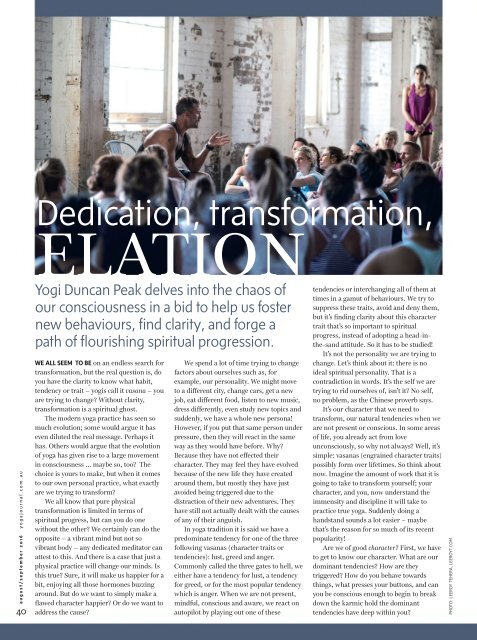Australian_Yoga_Journal_2016_08_09_downmagaz.com
You also want an ePaper? Increase the reach of your titles
YUMPU automatically turns print PDFs into web optimized ePapers that Google loves.
Dedication, transformation,<br />
august/september <strong>2016</strong> yogajournal.<strong>com</strong>.au<br />
40<br />
ELATION<br />
Yogi Duncan Peak delves into the chaos of<br />
our consciousness in a bid to help us foster<br />
new behaviours, find clarity, and forge a<br />
path of flourishing spiritual progression.<br />
WE ALL SEEM TO BE on an endless search for<br />
transformation, but the real question is, do<br />
you have the clarity to know what habit,<br />
tendency or trait – yogis call it vasana – you<br />
are trying to change? Without clarity,<br />
transformation is a spiritual ghost.<br />
The modern yoga practice has seen so<br />
much evolution; some would argue it has<br />
even diluted the real message. Perhaps it<br />
has. Others would argue that the evolution<br />
of yoga has given rise to a large movement<br />
in consciousness … maybe so, too? The<br />
choice is yours to make, but when it <strong>com</strong>es<br />
to our own personal practice, what exactly<br />
are we trying to transform?<br />
We all know that pure physical<br />
transformation is limited in terms of<br />
spiritual progress, but can you do one<br />
without the other? We certainly can do the<br />
opposite – a vibrant mind but not so<br />
vibrant body – any dedicated meditator can<br />
attest to this. And there is a case that just a<br />
physical practice will change our minds. Is<br />
this true? Sure, it will make us happier for a<br />
bit, enjoying all those hormones buzzing<br />
around. But do we want to simply make a<br />
flawed character happier? Or do we want to<br />
address the cause?<br />
We spend a lot of time trying to change<br />
factors about ourselves such as, for<br />
example, our personality. We might move<br />
to a different city, change cars, get a new<br />
job, eat different food, listen to new music,<br />
dress differently, even study new topics and<br />
suddenly, we have a whole new persona!<br />
However, if you put that same person under<br />
pressure, then they will react in the same<br />
way as they would have before. Why?<br />
Because they have not effected their<br />
character. They may feel they have evolved<br />
because of the new life they have created<br />
around them, but mostly they have just<br />
avoided being triggered due to the<br />
distraction of their new adventures. They<br />
have still not actually dealt with the causes<br />
of any of their anguish.<br />
In yoga tradition it is said we have a<br />
predominate tendency for one of the three<br />
following vasanas (character traits or<br />
tendencies): lust, greed and anger.<br />
Commonly called the three gates to hell, we<br />
either have a tendency for lust, a tendency<br />
for greed, or for the most popular tendency<br />
which is anger. When we are not present,<br />
mindful, conscious and aware, we react on<br />
autopilot by playing out one of these<br />
tendencies or interchanging all of them at<br />
times in a gamut of behaviours. We try to<br />
suppress these traits, avoid and deny them,<br />
but it’s finding clarity about this character<br />
trait that’s so important to spiritual<br />
progress, instead of adopting a head-inthe-sand<br />
attitude. So it has to be studied!<br />
It’s not the personality we are trying to<br />
change. Let’s think about it: there is no<br />
ideal spiritual personality. That is a<br />
contradiction in words. It’s the self we are<br />
trying to rid ourselves of, isn’t it? No self,<br />
no problem, as the Chinese proverb says.<br />
It’s our character that we need to<br />
transform, our natural tendencies when we<br />
are not present or conscious. In some areas<br />
of life, you already act from love<br />
unconsciously, so why not always? Well, it’s<br />
simple: vasanas (engrained character traits)<br />
possibly form over lifetimes. So think about<br />
now. Imagine the amount of work that it is<br />
going to take to transform yourself; your<br />
character, and you, now understand the<br />
immensity and discipline it will take to<br />
practice true yoga. Suddenly doing a<br />
handstand sounds a lot easier – maybe<br />
that’s the reason for so much of its recent<br />
popularity!<br />
Are we of good character? First, we have<br />
to get to know our character. What are our<br />
dominant tendencies? How are they<br />
triggered? How do you behave towards<br />
things, what presses your buttons, and can<br />
you be conscious enough to begin to break<br />
down the karmic hold the dominant<br />
tendencies have deep within you?<br />
PHOTO: LEEROY TEHERA, LEEROYT.COM


